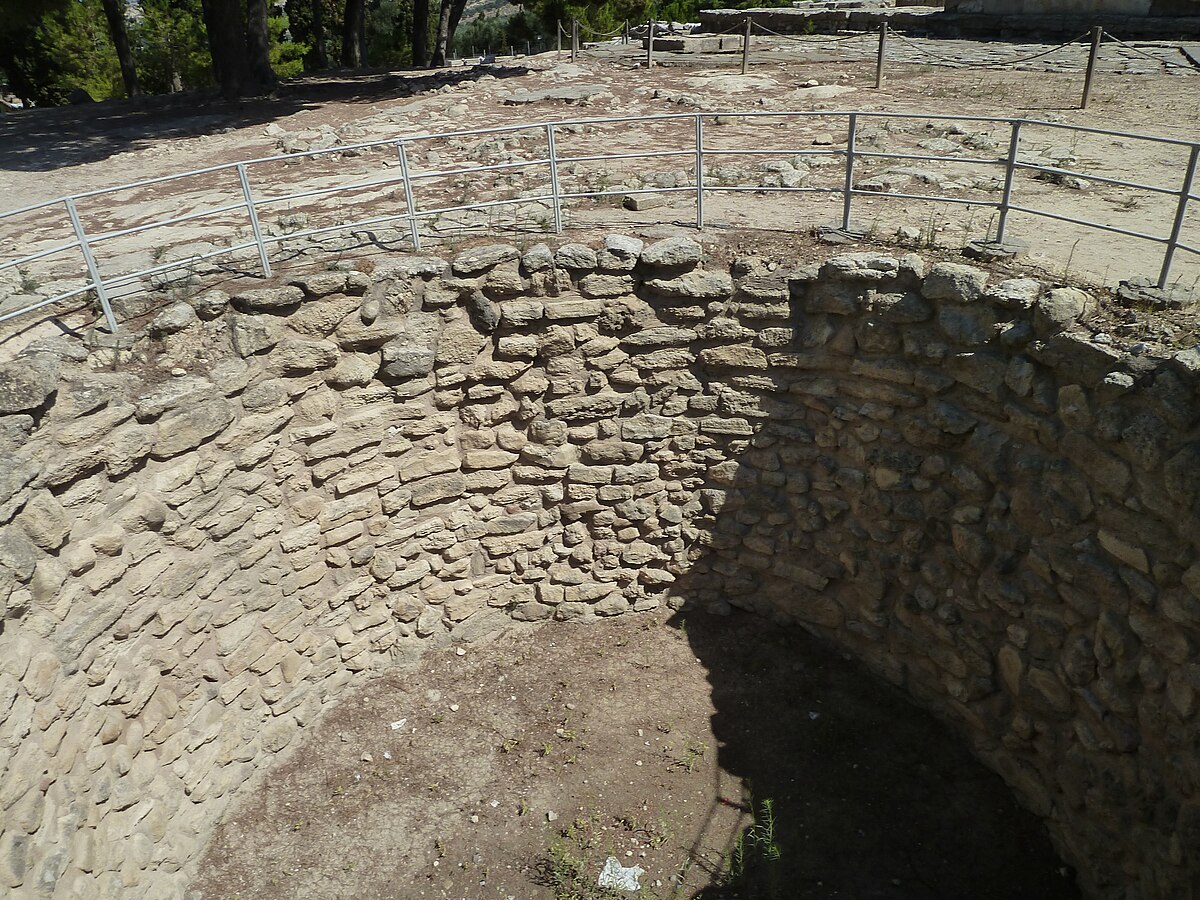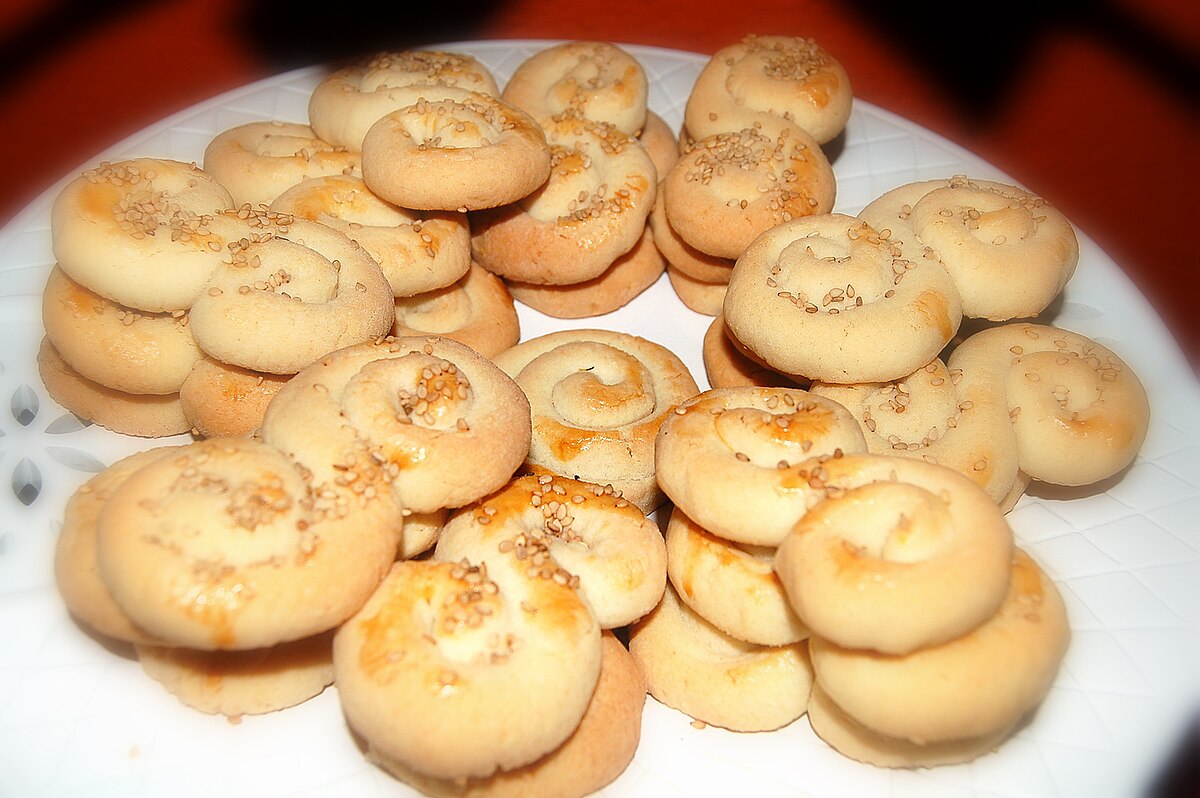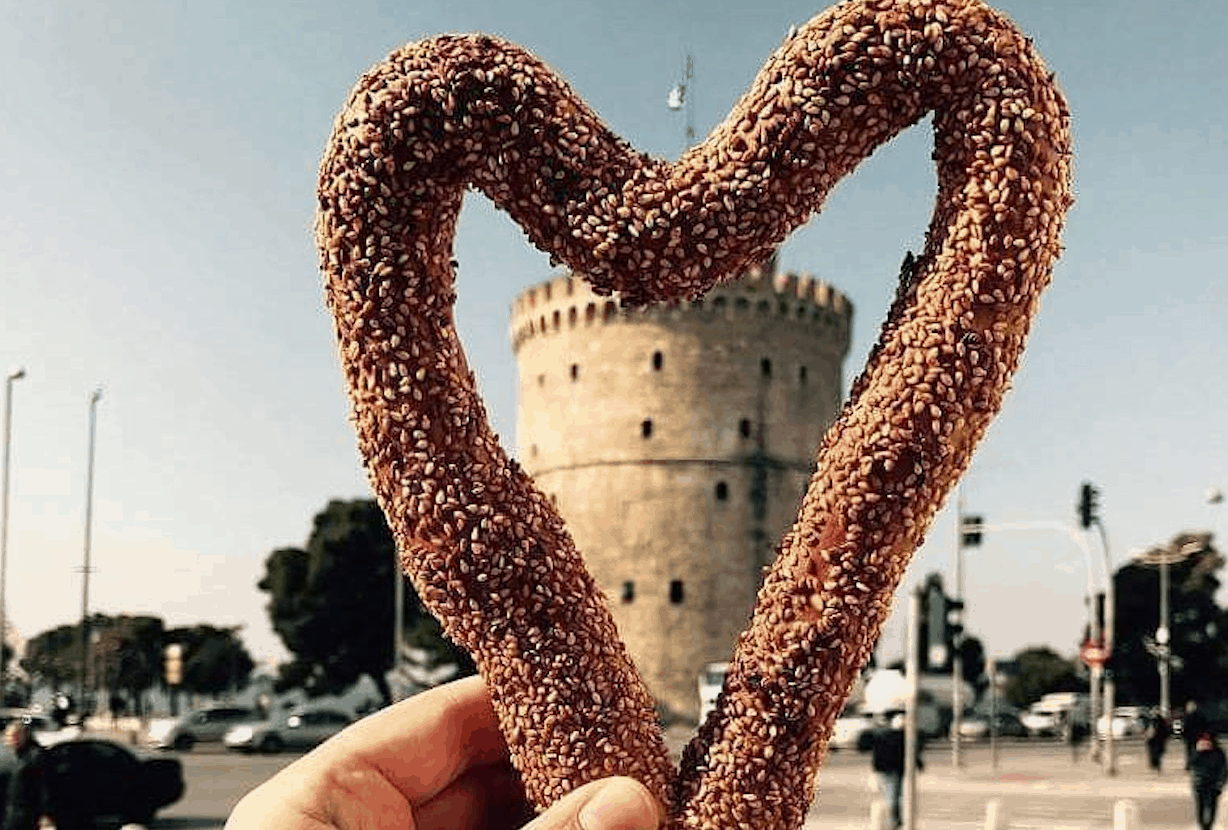Menu
Install the app
How to install the app on iOS
Follow along with the video below to see how to install our site as a web app on your home screen.
Note: This feature may not be available in some browsers.
You are using an out of date browser. It may not display this or other websites correctly.
You should upgrade or use an alternative browser.
You should upgrade or use an alternative browser.
1 - 20 of 24 Posts
greek_ggirl
Active member
I love Koulourakia!! Especially with a bit of orange zestKoulouaria are a bread-like cake that is traditionally served during Easter dinner. This is an especially popular dish in the Greek islands, although you can also find them on the mainland. I really miss getting together with the whole family and making these, it's one of my favourite traditions.
View attachment 496
I love Koulourakia and Kouloura both. Orange zest in koulourakia makes it so delicious! The Kouloura breads are always a staple in my house at Easter.I love Koulourakia!! Especially with a bit of orange zestthey're my favorite
greek_ggirl
Active member
At my house too! I wish I made them more often tbhI love Koulourakia and Kouloura both. Orange zest in koulourakia makes it so delicious! The Kouloura breads are always a staple in my house at Easter.
ellinasgolfer0320
Well-known member
It's mandatory that you sing plathw koulourakia when you make these.
k_tsoukalas
Administrator
Could you share the words? I have never sung it! I make these every Easter, they are a tradition in my household...It's mandatory that you sing plathw koulourakia when you make these.
ellinasgolfer0320
Well-known member
Sure.Could you share the words? I have never sung it! I make these every Easter, they are a tradition in my household...
Me ta dyo xerakia (with both hands)
plathw koulourakia (I make koulourakia)
koulourakia, koulourakia
O fournos tha ta psisei (the oven will bake them)
to spiti tha myrisei (the house will smell)
koulourakia, koulourakia
Ti glyka ki afrata (How sweet and fluffy)
ola myrodomata (all fragrant)
koulourakia, koulourakia
Gi' auto kai to sxoleio tous (so that's why at their school)
pairnoun ta paidakia (the kids bring them)
koulourakia, koulourakia
Last edited:
In my native town, in Magna Graecia [south Italy], there used to be the tradition of making Cullura (Koulura) for easter. It was sweetbread or bun with an egg baked in it. A greater variety of sweets was made for Palm Sunday, like pretzels etc., when they were attached to a palm-branch and taken to church. Little toys and crosses were also made by interweaving palm fronds. //Speaking of feasts and traditions, I remembered that the 8th of September used to be, in my town, the feast of MyLady of Graces, to whom a rustic shrine was dedicated, while outdoors a fair was held: merchants from town and other towns brought their wares and even animals (cattle) for sale. On this date, the Church officially celebrates the Birth of the Virgin Mary. The shrine is in a district of the township that must have been the civic center of the newly founded town of Thourioi and may have been a replica of the shrine dedicated to Athena Krathia (reported by Herodotus). When the people switched to Christianity, the rededication inevitably occurred. Athena was born out of Zeus' head, Mary was born normally, but by a miracle from Ann and Joachim. // I miss the ice cream I used to buy at the Fair.At my house too! I wish I made them more often tbh
This is so cool - I am going to try to sing this song next tie I make this!! My mother used to sing a song like this but I never knew the words...Sure.
Me ta dyo xerakia (with both hands)
plathw koulourakia (I make koulourakia)
koulourakia, koulourakia
O fournos tha ta psisei (the oven will bake them)
to spiti tha myrisei (the house will smell)
koulourakia, koulourakia
Ti glyka ki afrata (How sweet and fluffy)
ola myrodomata (all fragrant)
koulourakia, koulourakia
Gi' auto kai to sxoleio tous (so that's why at their school)
pairnoun ta paidakia (the kids bring them)
koulourakia, koulourakia
nm1999
Active member
Yes! Let's keep these traditions aliveThis is so cool - I am going to try to sing this song next tie I make this!! My mother used to sing a song like this but I never knew the words...
I totally agree, too many are being forgotten.Yes! Let's keep these traditions alive
As I have been investigating words, since my retirement, now I wondered about the origin of the name "Koulourakia"or, in my native language, "koulloura/kouddroura". Wikipedia does not help; so, I turned to a lexikon, the Liddlell-Scott "A Greek-English Lexikon" and then the Bailly "Greek-French Dictionary", which report the literature source of the Classical Greek words. Bailly cites "Koulloura", which is described as a small oval loaf of bread,or roll, sweetened, especially for infants. Thus, the tradition in question goes back to pre-Christian times, and obviously, the insertion of an egg (in larger rolls) must be specifically from Easter or egg/myth times. "Koulourakia" may be also a classical word, meaning "koulloura stuff" through the adjective *Koullourakios (which needs confirmation). Good stuff!Sure.
Me ta dyo xerakia (with both hands)
plathw koulourakia (I make koulourakia)
koulourakia, koulourakia
O fournos tha ta psisei (the oven will bake them)
to spiti tha myrisei (the house will smell)
koulourakia, koulourakia
Ti glyka ki afrata (How sweet and fluffy)
ola myrodomata (all fragrant)
koulourakia, koulourakia
Gi' auto kai to sxoleio tous (so that's why at their school)
pairnoun ta paidakia (the kids bring them)
koulourakia, koulourakia
ellinasgolfer0320
Well-known member
koulouraki comes from the word koulouri. Try searching that. "aki" just means little in Greek. The bread with the egg in it is called tsourekiAs I have been investigating words, since my retirement, now I wondered about the origin of the name "Koulourakia"or, in my native language, "koulloura/kouddroura". Wikipedia does not help; so, I turned to a lexikon, the Liddlell-Scott "A Greek-English Lexikon" and then the Bailly "Greek-French Dictionary", which report the literature source of the Classical Greek words. Bailly cites "Koulloura", which is described as a small oval loaf of bread,or roll, sweetened, especially for infants. Thus, the tradition in question goes back to pre-Christian times, and obviously, the insertion of an egg (in larger rolls) must be specifically from Easter or egg/myth times. "Koulourakia" may be also a classical word, meaning "koulloura stuff" through the adjective *Koullourakios (which needs confirmation). Good stuff!
Last edited:
Thank you for your suggestion. However, I think we are a bit confused about Greek -- ancient/classical and modern Greek. For instance, I don't find "coulouri" in vocabulaties/lexikons of classical Greek. Did some etymologist propose it hypothetically as the source of the modern Koulouraki? Furthermore, I don't find AKI as either one of the adjectives for "little", or as a diminutive-making ending, whereas -ION is the typical classical diminutive ending. I was wishing that the lexikons had "tsureki", since it would show the difference from Kolix [= a roll or loaf of coarse bread], which Durrell-Scott equates with Kollouros. Incidentally, some of the classical words have variants, wherefore they are spelled with either one or two L, and the initial syllable is either KOU- or KO-, but Kolouros (= fallen off, troncated) is obviously a homophone of, not identical with, the aforementioned Kollouros.koulouraki comes from the word koulouri. Try searching that. "aki" just means little in Greek. The bread with the egg in it is called tsoureki
auroracoor1
Active member
Really? So then how come Greeks add "Aki" to make everything "little"?Thank you for your suggestion. However, I think we are a bit confused about Greek -- ancient/classical and modern Greek. For instance, I don't find "coulouri" in vocabulaties/lexikons of classical Greek. Did some etymologist propose it hypothetically as the source of the modern Koulouraki? Furthermore, I don't find AKI as either one of the adjectives for "little", or as a diminutive-making ending, whereas -ION is the typical classical diminutive ending. I was wishing that the lexikons had "tsureki", since it would show the difference from Kolix [= a roll or loaf of coarse bread], which Durrell-Scott equates with Kollouros. Incidentally, some of the classical words have variants, wherefore they are spelled with either one or two L, and the initial syllable is either KOU- or KO-, but Kolouros (= fallen off, troncated) is obviously a homophone of, not identical with, the aforementioned Kollouros.
ellinasgolfer0320
Well-known member
Everything you're saying is over my head. For ancient Greek I'll need my wife... she studied it from middle school through high school (in Greece) and was forced to learn 1000s of words and learn the grammar. I, on the other hand, just know how to speak Greek and that's it haha. "Aki" is a suffix and it has several meanings. Adding "aki" to the word can mean "little" (e.g. skilo -> skilaki = puppy) but it can also be a term of endearment (giannis -> giannaki = little john/johnny). You could probably google "what does 'aki' mean on Greek" and find an explanation.Thank you for your suggestion. However, I think we are a bit confused about Greek -- ancient/classical and modern Greek. For instance, I don't find "coulouri" in vocabulaties/lexikons of classical Greek. Did some etymologist propose it hypothetically as the source of the modern Koulouraki? Furthermore, I don't find AKI as either one of the adjectives for "little", or as a diminutive-making ending, whereas -ION is the typical classical diminutive ending. I was wishing that the lexikons had "tsureki", since it would show the difference from Kolix [= a roll or loaf of coarse bread], which Durrell-Scott equates with Kollouros. Incidentally, some of the classical words have variants, wherefore they are spelled with either one or two L, and the initial syllable is either KOU- or KO-, but Kolouros (= fallen off, troncated) is obviously a homophone of, not identical with, the aforementioned Kollouros.
Last edited:
Everything you're saying is over my head. For ancient Greek I'll need my wife... she studied it from middle school through high school (in Greece) and was forced to learn 1000s of words and learn the grammar. I, on the other hand, just know how to speak Greek and that's it haha. "Aki" is a suffix and it has several meanings. Adding "aki" to the word can be mean little (e.g. skilo -> skilaki = puppy) but it can also be a term of endearment (giannis -> giannaki = little john/johnny). You could probably google "what does 'aki' mean on Greek" and find an explanation.
As you speak (modern) Greek, your information about the suffix -aki, and similar information I have just found, expands my acquaintance with the modern language, but as an etymologist I am still uncertain about its provenance; I still suppose it arose from the classical adjective *koulourAKIOS or KoullourAKIOS. I also found that some other diminutive or endearing terms are present also in derived dialects, such as Latin and my native language. The Greek linguistic ekoumene is immense!Everything you're saying is over my head. For ancient Greek I'll need my wife... she studied it from middle school through high school (in Greece) and was forced to learn 1000s of words and learn the grammar. I, on the other hand, just know how to speak Greek and that's it haha. "Aki" is a suffix and it has several meanings. Adding "aki" to the word can be mean little (e.g. skilo -> skilaki = puppy) but it can also be a term of endearment (giannis -> giannaki = little john/johnny). You could probably google "what does 'aki' mean on Greek" and find an explanation.
nadellii
Active member
Kind of going over my head as well LOLEverything you're saying is over my head. For ancient Greek I'll need my wife... she studied it from middle school through high school (in Greece) and was forced to learn 1000s of words and learn the grammar. I, on the other hand, just know how to speak Greek and that's it haha. "Aki" is a suffix and it has several meanings. Adding "aki" to the word can mean "little" (e.g. skilo -> skilaki = puppy) but it can also be a term of endearment (giannis -> giannaki = little john/johnny). You could probably google "what does 'aki' mean on Greek" and find an explanation.
Wikipedia has some info - what do you guys think, does their etymology make sense for kouloura and koulourakia?

 en.wikipedia.org
en.wikipedia.org

 en.wikipedia.org
en.wikipedia.org
I find it interesting that in the Koulourakia piece, they mentioned the Minoans.

Kouloura - Wikipedia

Koulourakia - Wikipedia
I find it interesting that in the Koulourakia piece, they mentioned the Minoans.
This article is saying that Koulouri comes from an Ancient Greek word "kollikon"

 greekcitytimes.com
greekcitytimes.com
That's all I've got for now. This is an interesting discussion!

Koulouri - Greece’s Favourite Breakfast On The Run + Recipe
If you are in Greece and after some breakfast on the run, Koulouri (Κουλούρι) is a fabulous option for you, as it’s both filling and healthy!
That's all I've got for now. This is an interesting discussion!
JOIN THE DISCUSSION AND READ OTHER GREEK INFO:
Learning about hospitality in Greece
- d_kakavouli
- Greek Traditions Forum
- Replies: 2
I was trying to explain to some non-Greek friends about hospitality in Greece. I feel like it's next level, but how do you explain it?
Could anyone help me explain any of the following:
Could anyone help me explain any of the following:
- Traditional welcome gestures in Greece
- Common household customs when visiting a Greek home
- Etiquette for showing appreciation to Greek hosts
- Any specific do's and don'ts that a foreigner should be aware of
When does Orthodox lent start this year?
- kcixcy
- Greek Traditions Forum
- Replies: 2
I noticed our Easter is late - May 5th - but Western Easter is at the end of March. Has Lent already started for them? When does our Lent start?
This year, I plan to do a stricter Lenten fast, so I want to plan some things out in advance.
Lent is a time for introspection, repentance, and spiritual growth. Through the dedicated practice of fasting, prayer, and charity, believers seek not only to grow closer to God but also to better understand themselves in relation to God’s will.
This year, I plan to do a stricter Lenten fast, so I want to plan some things out in advance.
Lent is a time for introspection, repentance, and spiritual growth. Through the dedicated practice of fasting, prayer, and charity, believers seek not only to grow closer to God but also to better understand themselves in relation to God’s will.
Greek Name Days Celebrations
- d_kakavouli
- Greek Traditions Forum
- Replies: 1
I have been encouraging my family and friends to let me know when their name days are. I know for my immediate family, of course, but I want to start honoring name days in addition to birthdays like they do in Greece.
But aside from wishing someone Chronia Polla, or happy name day, what else can we do? How do people in Greece celebrate? Is it much like a birthday?
But aside from wishing someone Chronia Polla, or happy name day, what else can we do? How do people in Greece celebrate? Is it much like a birthday?
Advice about making Greek coffee
- blopez34
- Greek Traditions Forum
- Replies: 1
I've developed a fascination with Greek culture and cuisine, and one aspect I'm particularly eager to explore is Greek coffee. I've heard that it's a unique and delicious brew, but I'm not quite sure how to make it at home.
I understand that Greek coffee is traditionally prepared using a special pot called a briki, but beyond that, I'm a bit lost. What type of coffee grounds should I use, and how finely should they be ground? Are there any specific brands or blends that are favored for making Greek coffee?
I'm also curious about the brewing process itself. Is there a particular technique for achieving that rich, foamy texture that Greek coffee is known for? And what about serving suggestions? Are there any traditional accompaniments or customs that I should be aware of?
Thanks in advance!
I understand that Greek coffee is traditionally prepared using a special pot called a briki, but beyond that, I'm a bit lost. What type of coffee grounds should I use, and how finely should they be ground? Are there any specific brands or blends that are favored for making Greek coffee?
I'm also curious about the brewing process itself. Is there a particular technique for achieving that rich, foamy texture that Greek coffee is known for? And what about serving suggestions? Are there any traditional accompaniments or customs that I should be aware of?
Thanks in advance!
Thinking about the Greek way of hospitality...
- nm1999
- Greek Traditions Forum
- Replies: 2
I thought I would ask your thoughts oh Philoxenia - or the Greek way, or art, of hospitality. I noticed this when I travel in Greece. People are so kind, they often go out of the way for us, when I feel that they don't have to! How can one describe this to someone?
From what I understand, Philoxenia is not merely a practice but a deeply ingrained value within Greek culture that extends far beyond the simple act of hosting. It reflects a genuine, heartfelt welcome to strangers, treating them with the same respect and generosity one would show to a dearly beloved friend. This beautiful tradition, passed down through generations, turns the act of hosting into an art form, embodying warmth, respect, and a profound sense of human compassion. There have been so many stories I can think of...
This thought process was triggered because we were watching My Big Fat Greek Wedding 3 - someone in the village had taken on a Syrian refugee. Is this a Greek hospitality thing? Philoxenia?
From what I understand, Philoxenia is not merely a practice but a deeply ingrained value within Greek culture that extends far beyond the simple act of hosting. It reflects a genuine, heartfelt welcome to strangers, treating them with the same respect and generosity one would show to a dearly beloved friend. This beautiful tradition, passed down through generations, turns the act of hosting into an art form, embodying warmth, respect, and a profound sense of human compassion. There have been so many stories I can think of...
This thought process was triggered because we were watching My Big Fat Greek Wedding 3 - someone in the village had taken on a Syrian refugee. Is this a Greek hospitality thing? Philoxenia?
Share and discuss Greek traditions related to Greek weddings, christenings, dance & holidays!
WorldwideGreeks.com is a free online forum community where people can discuss Greek food, travel, traditions, history and mythology.
Join Worldwide Greeks here!
Join Worldwide Greeks here!
JOIN COMMUNITY FOR FREE
LOGIN TO YOUR ACCOUNT



